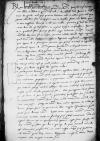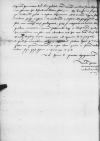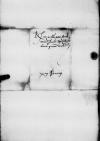Reddidi litteras Reverendissimae Dominationis Vestrae sacrae ⌊reginali maiestati⌋ post quarum lectionem vidi et audivi, quia Vestrae Reverendissimae Dominationis grata admodum fuit compositio cum domino ⌊Kostka⌋ facta, non dubito, quia in eam tragoediam deinceps et ille non incidet, quoniam per litteras et nuntium etiam data illi est disciplina, ne amplius desipiet et exundet.
Reverendissima Dominatio Vestra prudenter fecit, quia se facilem regiae voluntati summisit, id quod nunc illi detractum sit in aliquo, sarcietur indubie abunde regia cognitione, quod demum cedet in honorem eius et dignitatis ampliationem.
Ego vero quia Reverendissimae Dominationis Vestrae factus sum servitor seu potius virtutis et ingenitae probitatis Reverendissimae Dominationis Vestrae, serviam hic libenter et id, quod novero in rem et dignitatem illius pertinere, summis viribus suis promovere voluero atque bono servitori illius conveniet faciendum scribereque frequenter de rebus omnibus, de quibus Reverendissimam Dominationem Vestram scire arbitravero.
De novis aulicis nihil est, quod scribam, nisi serenissimus ⌊rex⌋ noster cum regia sua domo ex gratia Dei optime valet.
A statibus vero ⌊Ducatus⌋ istius parabatur expeditio bellica adversus ⌊hostem⌋, ut ab illo nunc fines tutentur et incursiones, si quas facere moliretur, propulsent, in sequentem annum militem mercenarium numerosum scripturi et aperto Marte cum hoste dimicaturi pro iniuria proque arcibus ablatis. Et cum motionis eius dies Pentecostes[1] apud ⌊Minsko⌋ praestitutus sit, ecce prorogatio illius facta est ad diem sanctorum Petri et Pauli[2], proceribus quibusdam hic suadentibus et inquientibus motionem huiusmodi sine milite mercenario commode subsistere non posse atque ea ratione duo milia equitum et mille peditum scripta sunt et pecunia in illos erogata praemittenturque ad fines istius ⌊Ducatus⌋ tuitione or tuitionem⌈tuitionetuitione or tuitionem⌉. Hostes etiam cognita motione communi .L.(?) numeroso equitatu arces in finibus suis munierunt, aiunt tamen captivi illorum, qui in excursionibus ipsorum capti sunt, fuisse ab illis nuntios quosdam pro die sancti Georgii[3] de pace tractanda vel indutiis ulterioribus proferendis, ut antea missis nuntiis petebant, ad legitimam ⌊pueri ducis⌋ aetatem designatos, nesciunt tamen dicere causam, cur rursus revocati sint.
 AAWO, AB, D. 4, f. 2v
AAWO, AB, D. 4, f. 2v
Magistratus per mortem domini olim ⌊palatini Cracoviensis⌋ vacantes nondum sunt distributi hidden by binding⌈[uti]uti hidden by binding⌉ nec speratur hic distributio illorum fieri.
Ex ⌊Hungaria⌋ scriptum est ⌊Ludovicum Gritti⌋ a ⌊caesare Thurcarum⌋ ad serenissimum ⌊regem Ferdi hidden by binding⌈[i]i hidden by binding⌉nandum⌋ fuisse missum, ut condiciones a caesare illo propositas acceptet cum nuntiis eius prolocutas, quas si acceptare noluerit, dira quaedam minantur serenissimo Ferdinando regi et illius terris, quod si hoc commentum non sit, non admodum res haec cum litteris illius domini ⌊Cornelii Duplicii Sceperi⌋ conveniet, ad Reverendissimam Dominationem Vestram scriptis.
Si quid hic innovabitur in his et aliis rebus, scribam Reverendissimae Paternitati Vestrae et eius gratiae me ex animo commendo et cupio illam optime et felicissime valere.



 AAWO, AB, D. 4, f. 2av
AAWO, AB, D. 4, f. 2av